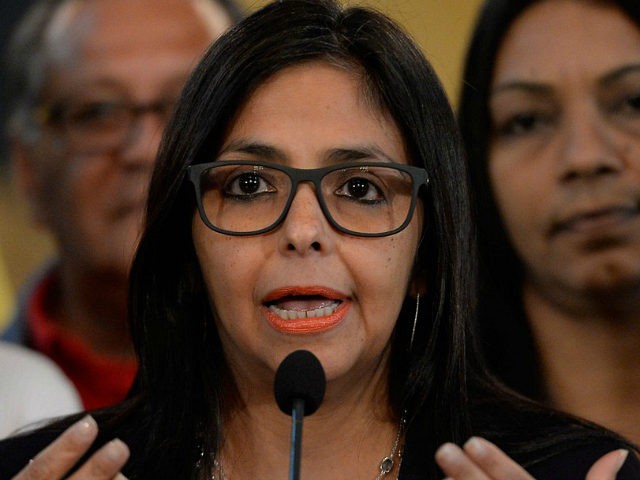Venezuelan foreign minister Delcy Rodríguez broke through a barrage of police and economic officials in Buenos Aires, Argentina, earlier this week in an attempt to storm into a meeting of the South American trade bloc Mercosur, which has suspended Venezuela’s membership due to its repeated violations of human rights.
Mercosur, now led by Argentina, agreed to suspend Venezuela from the group because the socialist government had “not adopted all the membership rules and treaties it had promised,” according to one Brazilian official. At the time, Rodríguez issued a statement saying, “Venezuela does not recognize this null and void action sustained by the law of the jungle of some officials who are destroying Mercosur.”
On Wednesday, Rodríguez’s challenge was put to the test. The foreign minister barreled through a barrage of police, reporters, and fellow dignitaries to enter the chamber in which the meeting was being held. “If they close the door to us we will, as our president [Nicolás] Maduro has said, go through the window,” she told reporters, insisting that, because Venezuela held Mercosur presidency before being ejected, its representative “does not need an invitation.”
Argentine law enforcement clearly disagreed, ejecting Rodríguez from the meeting, now postponed.
Venezuela’s socialist dictator Nicolás Maduro, currently in Cuba, claimed on Thursday that Argentine police had fractured Rodríguez’s collarbone and that police had also injured Rodríguez’s Bolivian counterpart David Cochehuanca. Maduro added that police had “hurled [Rodríguez] to the floor.” “We have lodged an energetic and total protest against the cowardice of the Argentine government against this dignified young lady who represents the voice of the people of Simón Bolívar,” Maduro said, according to Venezuelan state television.
Argentina was not the only nation to protest Rodríguez’s transgression, however. Her Uruguayan counterpart, Rodolfo Nin Novoa, called her entry into the meeting “a grave act, above all from the point of view of Argentine-Venezuelan relations.”
He defended Venezuela’s suspension from the trade bloc: “Treaties have obligations and rights. Venezuela enjoyed all the rights without committing to the obligations.”
Relations between Argentina and Venezuela rapidly deteriorated following the election of conservative, pro-freedom president Mauricio Macri in late 2015, following twelve years of left-wing Kirchner rule — first under late president Nestor Kirchner and, then, under his wife Cristina Fernández de Kirchner. Fernández de Kirchner’s foreign policy was especially favorable to the oppressive socialist and communist governments of the Western Hemisphere, including Cuba and Venezuela, and rogue regimes such as those of Iran and Russia.
Among the first things Macri did as president was to warn Venezuela that it would be expelled from Mercosur if it did not release its political prisoners and cease using state violence against peaceful protesters. “There cannot be room among Mercosur states for political persecution for ideological reasons, nor for the illegitimate deprivation of liberty of those who think differently,” he told his counterparts at a Mercosur meeting last year. He noted that the Mercosur charter allowed for suspension, sanctioning, or expulsion of a nation should it “break the democratic order.”
At the time, Rodríguez condemned Macri as “defending political violence” and claimed all imprisoned political prisoners were violent criminals, a claim many major human rights NGOs have flatly rejected.
From a family known for its involvement in Venezuelan socialists movements, Rodríguez is known to be a lover of designer fashion, particularly Valentino shoes, according to the Argentine newspaper La Nación.
In both her previous Communications Minister (press secretary) job and as Foreign Minister now, she has toed the party line on all of Maduro’s most controversial foreign policy views. Rodríguez has described the Islamic theocracy of Iran as a “friendly brother nation” while justifying socialist aggression towards Guyana by claiming the small South American nation was “exhibiting a dangerous and provocative policy against the Bolivarian Venezuela of peace, supported by the imperialist powers.” Rodríguez was also first in line to explain Venezuela’s ejection of international election observers in 2015, claiming the nonpartisan delegation had been “disrespectful” without elaborating.

COMMENTS
Please let us know if you're having issues with commenting.